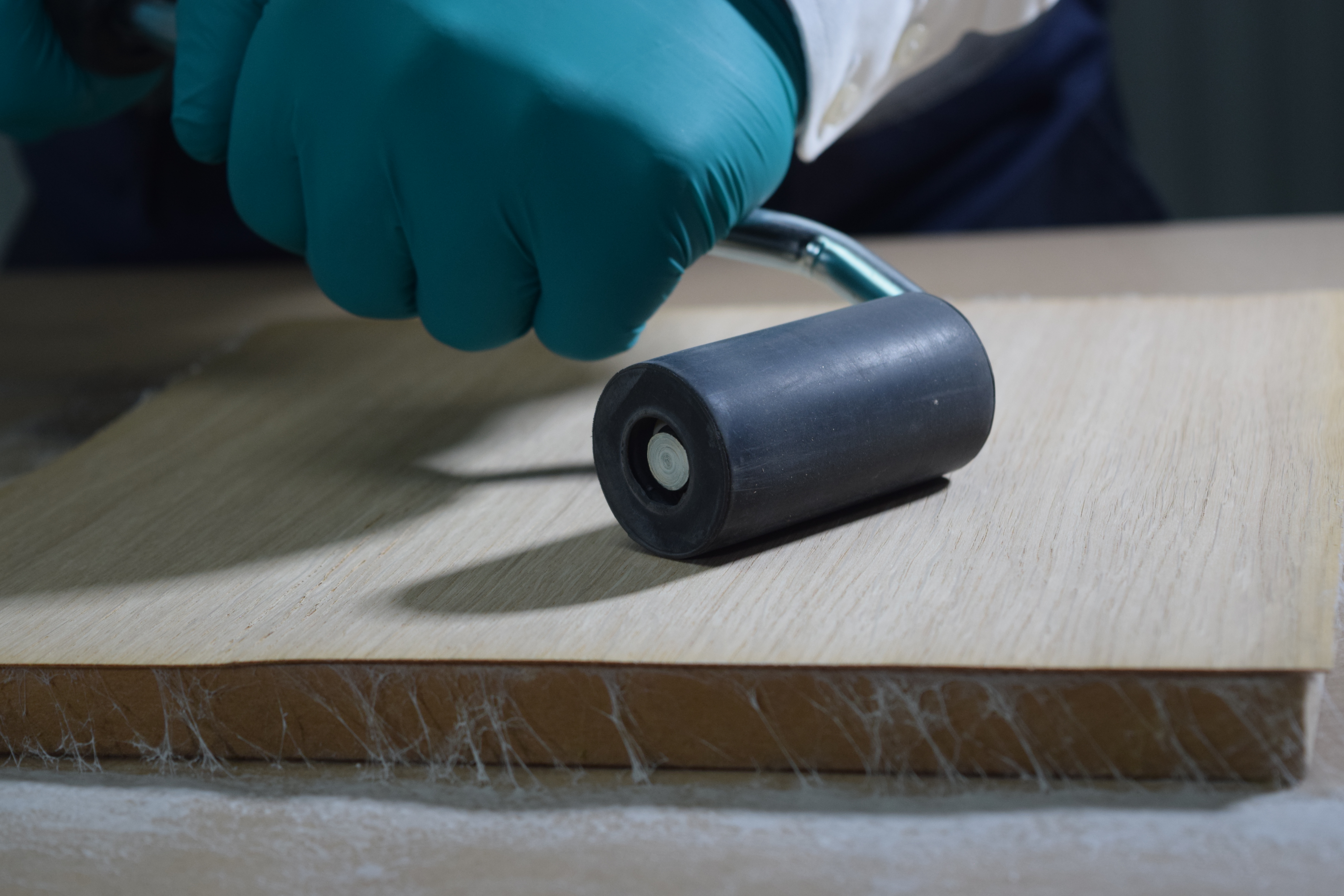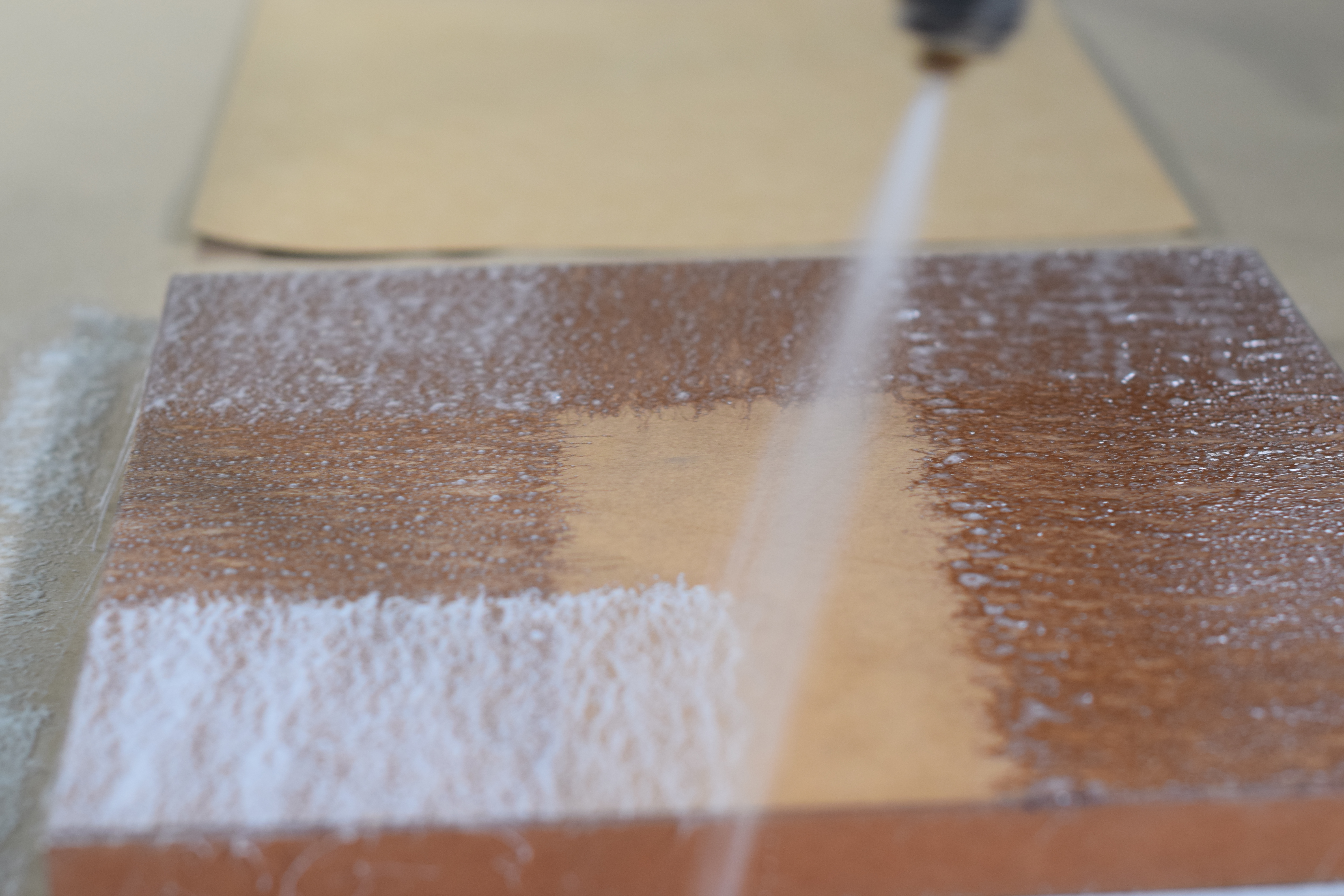As a furniture fabricator, you don’t need us to tell you that adhesive choice matters for the success of your business. With the cost of materials and labour rising across the globe, anything that can make you more competitive – whether in terms of speed or quality – can make a difference to your bottom line.
In the world of fabrication, spray adhesives are a relative newcomer to the party. While younger fabricators are often open to change, experienced employees may be hesitant, preferring to stick with tried-and-trusted methods of adhesive application and bonding, such as the use of manually-applied glues and clamping systems. But with significant productivity and wellbeing benefits, there’s a lot to be gained from making the switch to spray.
In this blog, we’ll take a look at some of the key ways switching to spray adhesives from Tensor Joinery can make your workshop’s operations more streamlined, saving you time and money while also protecting the health of your employees, and even improving sustainability.

What are the operational benefits of using spray joinery adhesive?
There are a number of operational benefits in switching to spray joinery adhesives for furniture manufacturing.
Speed
Spray adhesives offer furniture fabricators a significant advantage in terms of application speed and efficiency. Unlike traditional adhesive methods that require manual application with brushes or rollers, spray adhesives can be applied quickly and easily using a spray gun or aerosol can.
This means fabricators can cover larger surface areas in less time - a benefit that is especially valuable in high-volume furniture manufacturing settings, where efficiency is crucial.
Consistency
Spray adhesives can also help fabricators to achieve better results in terms of finish and consistency. Using a spray adhesive system for tasks such as laminating delivers a uniform spray pattern that eliminates the risk of anomalies or telegraphing in the finished surface.
Better bond integrity
When an adhesive is applied consistently in this way, it also ensures a better bond. With manually applied adhesives, there’s more room for human error – applying too much or too little adhesive, or even missing a spot. This can result in problems with the final bond, such as bubbling, warping or shearing. Using a spray adhesive system makes these events less likely, reducing the amount of work that ends up as scrap, and saving valuable time on rework and repair jobs.
Streamlining processes
Because spray joinery adhesives are usually solvent-based, and because of the fine mist or web spray that is applied to the surface, these products often boast very high tack, fast-drying performance. Tensor Joinery products such as our L12 offer almost immediate, robust tack, forming instant bonds that hold materials in place as soon as the two surfaces are brought together. This is a game-changer for furniture manufacturers, because it eliminates the need for labour-intensive and time-consuming clamping processes.
Product moves through the workshop more quickly, and outputs are higher, with less work involved. Solvent-based sprays can even be used for delicate jobs like applying paperback veneer, which would otherwise require a lengthy drying time in the press – the key to success is in the application method, and you can find out more about that here.

What are the sustainability benefits of switching to spray joinery adhesives?
Like all businesses, furniture manufacturers have to adhere to targets and standards on environmental sustainability, and this means looking carefully at which adhesives they use.
Switching to spray joinery adhesives can support these objectives in several ways:
- Reducing waste
For workshops producing large volumes of product, being able to purchase adhesives in a large format reduces waste. Tensor Joinery products are available in 22-litre and 110-litre canisters – the largest size typically delivering over 400m2 of coverage. Equally, our 500ml aerosol cans mean that on smaller or more niche jobs, there’s no risk of wasting an entire canister – simply choose the right size for the job at hand.
- Reducing VOCs
Conventional solvent-based joinery adhesives have a notoriously high VOC content and as a result of the heavier coat weight and slower application process, this means that both people and the environment are exposed to these harmful chemicals. Tensor Joinery adhesives are formulated with next-gen solvents, with a much lower VOC content. Adhesives like our L20 are compliant with Californian emissions guidelines, regarded as some of the strictest in the world. Our range also includes a growing number of adhesives that are free from dichloromethane, another harmful solvent.
What are the occupational health benefits of switching to spray joinery adhesives?
Like all manual workers, furniture fabricators are subject to a range of health risks in the workplace. Joinery workshops are full of hazardous equipment, and they can also be dusty and loud. Switching to spray adhesives can help eliminate some of the risks as follows:
Repetitive strain and other musculoskeletal injuries
Applying manual adhesives with a brush or roller is physically demanding. It involves gripping, reaching, stretching, bending and twisting – all of which can take a serious toll on the body after a period of months or years. Spray adhesives offer your team a more comfortable, ergonomic way of working. They are able to maintain an upright, neutral posture without needing to bend to reload their brush or roller. The spray wand does the work of reaching, so they are less likely to incur repetitive strain injuries to their arms and shoulders.
Reduced exposure to harmful solvents
As previously mentioned, Tensor Joinery’s adhesive range includes a number of options that are free from dichloromethane. This is a harmful solvent that can cause a number of health problems, ranging from skin and eye irritation right through to respiratory problems, kidney problems and even lung cancer. Using adhesives containing dichloromethane means workers need to wear advanced PPE, including respirator masks – but switching to a DCM-free spray alternative can help them work more comfortably and safely.
Are spray joinery adhesives more expensive than conventional products?
At first glance, spray joinery adhesives can seem to be more expensive than manual ‘bucket’ products. But take a closer look at the m2 coverage you can expect from each product, and you’ll quickly realise that spray joinery adhesives are often much more economical to use.
Coupled with the hours of labour you can save by using spray, and the reduced waste caused by human application errors, and switching to spray adhesive systems in your joinery workshop can be a powerful tool for enhancing productivity AND profitability.
Ready to make the switch?
If you’d like to know more about integrating spray adhesives into your workflows as a new user, our technical team will be happy to help. We can advise on which Tensor Joinery products are best for the processes you’re typically carrying out, and how to get started with our products.
Don’t forget, as a new Tensor Joinery customer, you’ll receive a free kick-off kit with your first order, containing a professional spray gun, tip and hose. Get in touch today to find out more!